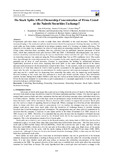Do Stock Splits Affect Ownership Concentration of Firms Listed at the Nairobi Securities Exchange?

View/
Date
2013Author
John K, Karuitha
Samuel O, Onyuma
Robert, Mugo
Metadata
Show full item recordAbstract
Corporations split their shares in order to make them more affordable to the retail investors. Theoretically,
increased buying of the stock post split by retail investors should be experienced. Existing literature on effect of
stock splits are from studies conducted in developed markets, much of it focusing on market efficiency. The
objective of this study was to analyze the effect of stock splits on ownership structure of listed firms in Kenya.
Using a data collection sheet, secondary data was collected from the published financial statements of listed
firms, which had conducted stock splits between 2004 and 2010. A Herfindahl- Hirschman Index was used to
measure ownership concentration among the top ten shareholders before and after the split. The overall change
in ownership structure was analyzed using the Wilcoxon Rank Sum Test at 95% confidence level. The results
show that although the ownership structure for the companies in the study significantly changed, the change was
generally not in favor of retail investors. Contrary to expectations, the holding by institutional investors
significantly increased in most cases, implying that stock splits do not cause enough interest in the shares
amongst retail investors to tilt the proportions owned in their favor. To the contrary, stock split encourages retail
investors to off load their shares in a bid to lock in profits occasioned by the appreciation in the value of the
shares after the split. An important recommendation for market regulators and corporate managers is that a stock
split may not be a useful tool for dispersing firm ownership but rather only for improving stock liquidity.
Investors looking to buy stocks that have announced a stock split should carefully analyze their information
content, because during stock market bubble a split may not convey accurate future prospects for the company.
Given the increased demand for stocks when a split is announced, it is an ample opportunity to lock in profits for
investors looking to sell their shares
